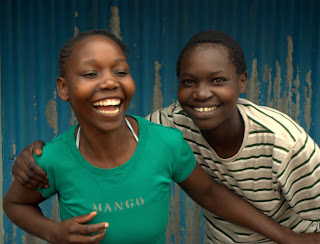This week, the girls of Mathare Cohort 1 received their Employability Training Manuals. This is the last workbook of the three-part YE curriculum. They began right away on Lesson 1: Understanding Employment & Employability. Their first assignment of the morning was to define employment—both formal and informal. The girls then discussed the advantages and disadvantages of each type.
The "essentials" of employability were taught at the end of the lesson. These include, but are not limited to, core academics, communication—both verbal & writing, listening, presentation, suitability, flexibility, persuasion, teamwork, leadership, planning & organizing, investigating & problem solving and numeracy.
Lesson 2 was also completed. While working through this lesson, the girls identified their career interests. In addition, they had the opportunity to assess their own level of employability through making use of the "Employability Skills Chart" found in their workbooks. The Employability Skills Chart focuses on linking the girls' natural talents with the employability skills these abilities possibly express. For example, girls who enjoy sports are most likely already good at working in teams.
At the end of class, the facilitators met to choose the 18 girls who will have the opportunity to attend Acwit in the coming weeks. Acwit is an additional Technoserve initiative teaching information technology. The girls chosen for the program will meet for several hours every day for three weeks in Lavington to perfect their computer skills.
The ladies of Kawangware Cohort 2 began their Tuesday gathering reviewing the “5 Cs of Entrepreneurship” they learned last week—cash, capital, competition, character and conditions. The girls then broke up into their small groups to work through the “Business Idea Generator,” which allowed them to test their brainstormed business ideas against the 5 Cs. At the end of their discussion, one girl from each group presented on their conclusions.
The "essentials" of employability were taught at the end of the lesson. These include, but are not limited to, core academics, communication—both verbal & writing, listening, presentation, suitability, flexibility, persuasion, teamwork, leadership, planning & organizing, investigating & problem solving and numeracy.
Lesson 2 was also completed. While working through this lesson, the girls identified their career interests. In addition, they had the opportunity to assess their own level of employability through making use of the "Employability Skills Chart" found in their workbooks. The Employability Skills Chart focuses on linking the girls' natural talents with the employability skills these abilities possibly express. For example, girls who enjoy sports are most likely already good at working in teams.
At the end of class, the facilitators met to choose the 18 girls who will have the opportunity to attend Acwit in the coming weeks. Acwit is an additional Technoserve initiative teaching information technology. The girls chosen for the program will meet for several hours every day for three weeks in Lavington to perfect their computer skills.
The ladies of Kawangware Cohort 2 began their Tuesday gathering reviewing the “5 Cs of Entrepreneurship” they learned last week—cash, capital, competition, character and conditions. The girls then broke up into their small groups to work through the “Business Idea Generator,” which allowed them to test their brainstormed business ideas against the 5 Cs. At the end of their discussion, one girl from each group presented on their conclusions.
The rest of the afternoon was spent completing Lesson 11: Marketing Research on the Idea. The girls went on another field trip to the local marketplace to interview customers about what they expect of businesses regarding the quality of the products they produce as well as to study their potential competitors. They used worksheets found in their workbooks to record their findings.
While the Kawangware market was typically hectic, the different groups were able to gain some valuable insights into what their experience starting their own businesses will be like in the coming weeks!






Comments
Post a Comment